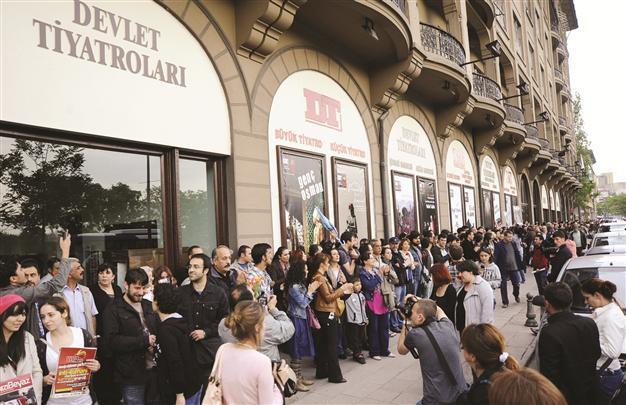Protests against privatization of theaters continue in capital
ANKARA - Hürriyet Daily News

The group of protestors, gathering in front of Ankara’s Küçük Theater, say Prime Minister Erdoğan’s latest decision, which focuses on the privatization of the state theaters, means that many people will not have access to theater in the future. AA photos
Stage actors and actresses have gathered in Ankara to protest the latest government decisions regarding the privatization of theaters. A crowd gathered in front of the Küçük Theater and handed out carnations to people watching them. They also announced a written statement during the march.The attendees of the march said the prime minister’s latest decision, which focuses on the privatization of the state theaters, meant that many people would not have access to theater in the future.
“As you all know, tickets for the state theaters are very cheap. … We Ankara theater lovers can watch professional productions of classic musicals for the reasonable price of 6 to 10 [Turkish] Liras. However, unfortunately, at a private theater we won’t be able to watch plays at this price,” read the written statement.
The statement also said touring theater would be affected by privatization. “Through touring, we have the opportunity to bring plays to different parts of Turkey such as Erzurum, Adana and Konya,” the statement said, and continued to say that eliminating the ability of state-funded theaters to tour would deprive smaller cities of important cultural exposure.
Appreciating theater
Speaking during the protest, Republican People’s Party (CHP) Ankara deputy Aylin Nazlıaka said it was an honor to be an actor or actress, but it was even more important to appreciate theater. “So I say we should be grateful for our actors and actresses.” Last week her party presented a proposal to Parliament to explain the problems facing actors, Nazlıaka said, adding that every part of Turkey should have a proper theater.
Levent Tüzel, an independent parliamentary deputy from Istanbul, said theaters do not employ only actors, but also technical staff, directors, lighting technicians and many more. Tüzel said the main source of the problem was that government would act as the decision-making body in choosing plays. “Here we see a government against theaters.”
“This is an attempt to tame the city theaters and state theaters,” said Can Başar, speaking on behalf of the theater actors. “Artistic creation should not be a part of politics,” he added, noting that the most important thing was to provide the necessary platform.
State Theaters director Yücel Erten said people are currently talking about conservative art. This is not compatible with the nature of art, he said. Privatizing theaters would render them soulless, Erten said, and the theaters do not need destruction but restoration. “If we are talking about free theaters, the idea of privatization is not suitable for that,” he said, adding that privatization would destroy the theaters.
The march continued, with banners reading, “Don’t touch my theater,” “Free theater” and “We will not stay silent.”
Government discusses the theaters
The government has decided to discuss the privatization of Turkey’s state theaters and Istanbul’s city theaters, the Hürriyet Daily News had reported earlier. The ministers of culture and finance had been asked to conduct a preliminary study on the issue, Deputy Prime Minister Bülent Arınç had said. “We will make a final decision afterward,” he said.
Arts and culture in Turkey will not decline, but rather develop, Culture and Tourism Minister Ertuğrul Günay has said. Speaking about the recent decisions taken on the City Theaters, Günay said the right thing to do was first to discuss the issue in Cabinet. “We are trying to make theaters accessible to everyone in Turkey, to make both state and private theaters available to the public,” he said.
Everyone deserves to use the theater more actively, Günay said, and denied that the government was against theaters or other cultural activities. “Our main aim is to make the theater more integrated into the public space. We will find a suitable model,” he said.
















